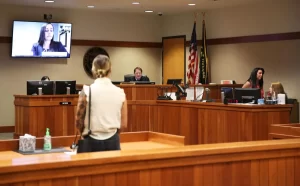How to Prove a Coparent Is Emotionally Abusing a Child
What Part Does Emotional Abuse Play In A Custody Battle?
Emotional abuse can severely damage a child’s well-being and self-esteem. If you suspect the coparent of your child is emotionally abusive, documenting clear evidence and working constructively with the courts is essential to limit further harm.
What Constitutes Emotional Abuse
Emotional abuse involves harming a child psychologically and developmentally through behaviors like:
- Criticism/Verbal Assaults: Constantly insulting or demeaning a child
- Isolation: Restricting normal social interactions
- Rejection: Refusing to provide child affection/support
- Terrorizing: Threatening violence/harm
- Ignoring: Failing to meet child emotional needs
- Corrupting: Encouraging delinquent/criminal acts
Chronic emotional abuse can cause anxiety, depression, low self-worth, behavioral issues, and lasting trauma. Documenting this mistreatment is vital.
EVIDENCE OF EMOTIONAL ABUSE CAN BE PIVOTAL IN YOUR CUSTODY CASE
Documenting Evidence of Emotional Abuse
In a custody battle, concrete proof of abuse strengthens arguments for limiting an abusive parent’s rights. Useful documentation includes:
- Incident Logs: Record date/time, what happened, what was said, and other details. Be objective.
- Witness Accounts: Note names/contact info of anyone else present.
- Pictures: Photograph injuries or damage after incidents.
- Medical Records: Request reports from child’s doctor.
- School/Daycare Reports: Teachers often witness signs of abuse.
- Videos/Audio: If legally able to do so, capture verbal assaults.
- Text Messages/Emails: Save demeaning, threatening, or harassing messages.
Compile and organize evidence chronologically to demonstrate a pattern of harmful behavior over time, not just isolated incidents.
Identifying Signs of Emotional Abuse
Abusers attempt manipulation and control through behaviors like:
- Verbal Criticism: Name-calling child or saying extremely hurtful remarks regarding child’s attributes.
- Using Affection as Reward/Punishment: Giving child affection intermittently to maintain control. Withdrawing affection as punishment.
- Isolating Child: Trying to cut child off from family, friends, and typical childhood socialization.
- Jealous/Controlling Behavior: Restricting child through excessive rules, demanding obedience, invading privacy by reading diary/texts/emails, etc.
- Scapegoating Child: Blaming child unfairly for parent’s problems to make child feel perpetually inadequate.
Make note if you observe patterns like these over a prolonged timeframe. The signs can be subtle, so track details.
Using Evidence To Prove Abuse In Court
Present documentation through:
- Court Documentation: Have evidence officially entered into the court record.
- Eyewitness Testimony: Take the stand detailing experiences and observations. Answer questions from lawyers/judge.
- Third-Party Witnesses: Those who observed incidents can be compelled to testify.
- Child Interview: A child psychologist/evaluator from court or CPS may interview child.
Reference multiple proof sources to demonstrate abuse is frequent and ongoing rather than anomalies. Prepare for opposing side to try diminishing credibility of evidence, so have robust documentation ready.
How a judge can pick out an abusive parent based on how they behave in court
Working with Family Courts
Judges award custody based partly on ensuring child safety. Advocate for interventions allowing courts to fully investigate risks to child. This may involve:
- Requesting Court Appoint Guardian Ad Litem: This neutral third party interviewed all parties, reviews evidence, and makes custody recommendations based solely on child best interest. Their insights help judges protect vulnerable children.
- Advocating Judges Order A Custody Evaluation: A court psychologist will evaluate all parties across multiple sessions to identify risks before finalizing custody terms. These sessions often reveal parental deficiencies not evident on the surface.
- Referencing State Laws: Research your state laws pertaining to emotional child abuse. If the state specifies this behavior as domestic violence, emphasize how it legally necessitates protective action from the court. Providing copies of the statutes to judges shows them you know your rights in this situation.
Family court environments grow tense when abuse accusations arise. Always remain calm and decorous throughout proceedings to avoid being perceived as antagonistic. Let documentation speak for itself.
Getting Therapeutic Support
Coping with a contentious custody battle is exhausting, especially with an abusive ex exacerbating stress. Seek assistance through:
- Family and Friends: Share honestly about your situation with loved ones. Their emotional support makes an incredible difference.
- Domestic Abuse Advocacy Organizations: Groups like SafeHorizon offer counseling, housing assistance, legal help, and other abuse victim resources. Speaking to others who went through similar predicaments can validate your experiences and provide guidance navigating the courts.
- Individual Therapy: A counselorspecializing in custody disputes, coparenting dysfunction, and domestic abuse provides structured guidance tailoring a self-care regimen fitting your unique situation. Setting up regular sessions gives you an empathetic listening ear.
You and your child both need outlets providing healthy coping tools as this custody situation progresses. Support networks preserve stamina and clarity moving forward.
Moving Forward Positively
The paramount priority is safeguarding your child’s wellbeing, particularly by removing them from the regular presence of an emotionally abusive parent. Simultaneously focus on:
- Keeping Child Out of The Middle: Vent to friends rather than your child about frustrations with the other parent. Do not burden children with adult disputes. Model respectfulness whenever referring to the coparent around your child.
- Establishing Coparent Boundaries: Utilize a court mediator at custody exchanges. Communicate through legal channels rather than directly. Eliminate ambiguity around expectations to avoid unnecessary conflicts.
- Providing Stability: Maintain routines surrounding school, extracurriculars, social connections, etc for your child despite tumultuous changes between households. Consistency and reliability helps counteract chaos.
While battling emotional abuse allegations severely strains coparenting relationships, remember keeping your child’s developmental/socioemotional needs first mitigates their trauma. This propels all choices moving forward. Focus positive energy there.
Frequently Asked Questions About Documenting Emotional Abuse
Q: How much evidence is needed to prove abuse accusations?
A: Document 5-10 clear incidents ideally with multiple forms of proof like eyewitness accounts, pictures, hospital records, etc. The more evidence from credible third parties over an extended timeframe that establishes a pattern of chronic emotional abuse rather than anomalies, the more compelling courts find arguments.
Q: What if the emotionally abusive behavior happens without witnesses or evidence?
A: Capture as many concrete details as possible surrounding the interactions soon after incidents while facts remain fresh. Avoid editorializing. Stick to factual recounting then highlight the direct harm these events inflict on the child for judges. Seeing impacts framed through child’s perspective compels intervention.
Q: Could attempts to document abuse be used against me in court?
A: Discuss strategies safely documenting abuse with your family court lawyer beforehand. Things like video recording without consent could spur counter lawsuits. Simply keep detailed written incident reports. As long as you remain within legal bounds, thoroughly documenting abuse generally strengthens custody cases.
Q: What should I do if my child is reluctant to admit emotional abuse from other parent?
A: Never pressure your child to disclose anything. Simply voice consistent availability to listen openly when they do want to talk. Then ensure your child has access to school counselors where trained experts can facilitate sensitive conversations if abuse concerns arise from teachers or friends. Emphasize child feels safe coming to you.
Q: How can courts help repair parent/child bonds after emotionally abusive custody battles?
A: Many courts mandate intensive reunification therapy conducted by specialized psychologists aiming to help children process trauma inflicted by one parent while rebuilding trust where possible. The abusive parent must demonstrate willingness to follow program rules and change negative behaviors under close monitoring for the court-ordered therapy to proceed successfully. Statistically these programs do repair a majority of strained parent/child relationships.







